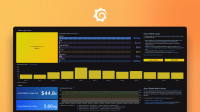This is documentation for the next version of Alloy. For the latest stable release, go to the latest version.
otelcol.exporter.logging
Warning
The OpenTelemetry Collectorloggingexporter is deprecated. It will be removed from the upstream Collector repository in September 2024.otelcol.exporter.loggingmay also be removed in a future Alloy version. Useotelcol.exporter.debuginstead.
otelcol.exporter.logging accepts telemetry data from other otelcol components
and writes them to the console.
This component writes logs at the info level. The logging config block must be configured to write logs at the info level.
Note
otelcol.exporter.loggingis a wrapper over the upstream OpenTelemetry Collectorloggingexporter. Bug reports or feature requests will be redirected to the upstream repository, if necessary.
Multiple otelcol.exporter.logging components can be specified by giving them
different labels.
Usage
otelcol.exporter.logging "LABEL" { }Arguments
otelcol.exporter.logging supports the following arguments:
| Name | Type | Description | Default | Required |
|---|---|---|---|---|
verbosity | string | Verbosity of the generated logs. | "normal" | no |
sampling_initial | int | Number of messages initially logged each second. | 2 | no |
sampling_thereafter | int | Sampling rate after the initial messages are logged. | 500 | no |
The verbosity argument must be one of "basic", "normal", or "detailed".
Blocks
The following blocks are supported inside the definition of
otelcol.exporter.logging:
| Hierarchy | Block | Description | Required |
|---|---|---|---|
| debug_metrics | debug_metrics | Configures the metrics that this component generates to monitor its state. | no |
The > symbol indicates deeper levels of nesting. For example, client > tls
refers to a tls block defined inside a client block.
debug_metrics block
The debug_metrics block configures the metrics that this component generates to monitor its state.
The following arguments are supported:
| Name | Type | Description | Default | Required |
|---|---|---|---|---|
disable_high_cardinality_metrics | boolean | Whether to disable certain high cardinality metrics. | true | no |
level | string | Controls the level of detail for metrics emitted by the wrapped collector. | "detailed" | no |
disable_high_cardinality_metrics is the Grafana Alloy equivalent to the telemetry.disableHighCardinalityMetrics feature gate in the OpenTelemetry Collector.
It removes attributes that could cause high cardinality metrics.
For example, attributes with IP addresses and port numbers in metrics about HTTP and gRPC connections are removed.
Note
If configured,disable_high_cardinality_metricsonly applies tootelcol.exporter.*andotelcol.receiver.*components.
level is the Alloy equivalent to the telemetry.metrics.level feature gate in the OpenTelemetry Collector.
Possible values are "none", "basic", "normal" and "detailed".
Exported fields
The following fields are exported and can be referenced by other components:
| Name | Type | Description |
|---|---|---|
input | otelcol.Consumer | A value that other components can use to send telemetry data to. |
input accepts otelcol.Consumer data for any telemetry signal (metrics,
logs, or traces).
Component health
otelcol.exporter.logging is only reported as unhealthy if given an invalid
configuration.
Debug information
otelcol.exporter.logging does not expose any component-specific debug
information.
Example
This example receives OTLP metrics, logs, and traces and writes them to the console:
otelcol.receiver.otlp "default" {
grpc {}
http {}
output {
metrics = [otelcol.exporter.logging.default.input]
logs = [otelcol.exporter.logging.default.input]
traces = [otelcol.exporter.logging.default.input]
}
}
otelcol.exporter.logging "default" {}Compatible components
otelcol.exporter.logging has exports that can be consumed by the following components:
- Components that consume OpenTelemetry
otelcol.Consumer
Note
Connecting some components may not be sensible or components may require further configuration to make the connection work correctly. Refer to the linked documentation for more details.



